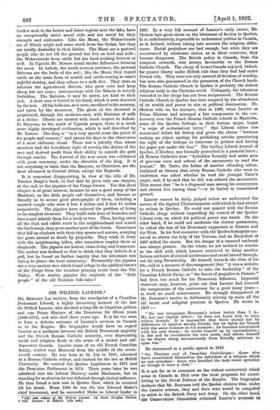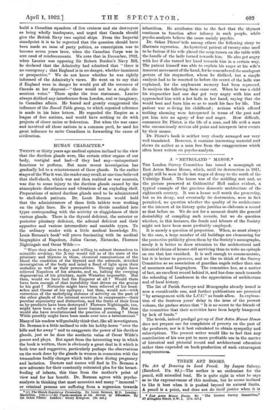SIR WILFRID LAURIER.•
Me. Stemmon has written, from the standpoint of a Canadian Protestant Liberal, a highly interesting memoir of the late Sir Wilfrid Laurier, who devoted a long life to Canadian polities and was Prime Minister of the Dominion for fifteen years (1896-1911), and who died three years ago. It is far too soon to form a definite estimate of Laurier's services to Canada or to the Empire. His biographer would have us regard Laurier as a mediator between the British Protestant majority and the French Roman Catholic minority, ever deprecating racial and religious feuds in the name of a united and self- dependent Canada. Laurier came of an old French Canadian family, settled near Montreal from the middle of the seven- teenth century. He was born at St. Lin in 1841, educated at a Roman Catholic college, and trained for the law at McGill University. He entered the Quebec Legislature in 1871 and the Dominion Parliament in 1874. Three years later he was admitted into the Liberal Ministry under Mackenzie, but on standing for re-election he was defeated through clerical influence. He then found a new seat in Quebec East, which he retained till his death. From 1880 he was the late Edward Blake's chief lieutenant, and he succeeded Blake as Liberal leader in 4' IA!. Nei Lakes of Mr Wilfrid • B Oscar Douglas Skoitoa.
2 vols. louden: H. Milford. (42s. net.]
1887. In a very full account of Laurier's early career, Mr. Skelton lays great stress on the bitterness of faction in Quebec. It is, imfortunately, impossible to understand polities in Canada,
as in Ireland, without taking into account the religious differ• enoes. Racial prejudices are bad enough, but when they are accentuated by intolerant (Aeries, as in these countries, they become dangerous. The British policy in Canada, from the conquest onwards, was always favourable to the Roman Catholic Church. The clergy of Lower Canada enjoyed, indeed, far greater liberty under British rule than they had had under French rule. They were not only assured of freedom of worship, but were also guaranteed in the possession of the Church lands. The Roman Catholic Church in Quebec is probably the richest religious body in the Christian world. Unhappily, the toleration extended to the clergy has not been reciprocated. The Roman Catholic Church in Quebec has been tempted by the abundance of its wealth and power to aim at political domination. Mr. Skelton tells us, for instance, that in 1896, when Laurier as
Prime Minister had arranged a fair compromise in the con- troversy over the French Roman Catholic schools in Manitoba, some of the Quebec bishops, in their furious anger, began
" a reign of ecclesiastical terror." One Liberal editor was summoned before his bishop and given the choice " between
making an abject apology for publishing articles questioning the right of the bishops to intervene in politics and having his paper put under the ban." The leading Liberal journal of Quebec, L'Ekcteur, was formally proscribed in a pastoral letter ; all Roman Catholics were " forbidden formally and under pain of grievous error and refusal of the sacraments to read the journal." Mr. Tarts, the father of another offending editor,
explained at Ottawa that every Roman Catholic who went to confession was asked whether he read the younger Tarte's paper, and, if he said that he did, was refused the sacraments. That meant that " he is a disgraced man among his countrymen and cannot live among them "—or be buried in consecrated ground.
Laurier cannot be fairly judged unless we understand the nature of the bigoted Ultramontanism with which he had always to reckon in Quebec. He could not quarrel with the Roman Catholic clergy without imperilling his control of the Quebec Liberal vote, on which his political power was based. On the other hand, if he could not moderate the clerical pretensions, he risked the loss of his Protestant supporters in Ontario and the West. In his first encounter with the Quebec bishops he con- trived to obtain the help of the Vatican, and an Encyclical of 1897 stilled the storm. But the danger of a renewed outbreak was always present. On the whole, we are inclined to wonder at the skill with which Laurier contrived to delay another furious outburst of clerical intolerance and racial hatred through. out his long Premiership. He himself, towards the close of his
life, said in a moment of discouragement that " it was a mistake for a French Roman Catholic to take the leadership " of the Canadian Liberal Party, as " the forces of prejudice in Ontario " had been too much for his Protestant followers. Impartial observers may, however, point out that Laurier had lowered
the temperature of the controversy for a good many years— in itself no small achievement. He strongly disapproved of Mr. Bourassa's tactics in deliberately stirring up anew all the old racial and religious passions in Quebec. He wrote in 1907 :—
" No one recognizes Bourassa's talent better than I do. He has one capital defect : ho does not know how to keep within bounds. It is impossible that there should not be differences of opinion among friends, but he fights his friends with the same violence as his enemies ; he becomes intoxicated with his own words : he works himself up by contradiction ; in the end he overshoots his own mark, and allows himself to be drawn along unconsciously from friendly criticism to open war."
He denounced in a public speech in 1910
" the Pharisee end of Canadian Catholicism : those who have constituted themselves the defenders of a religion which no one attacked : those who handled the holy-water sprinkler as though it wore a club."
It is not for us to comment on the violent controversy which arose in Canada in 1910 over the rival proposals for contd.
buting to the Naval Defence of the Empire. The biographer declares that Mr. Bourassa told the Quebec electors that. under the Laurier scheme, they and their sons would be compelled
to enlist in the British Navy and Army. On the other hand, the Conservative Opposition critioized Laurier's proposal tq build a Canadian squadron of five cruisers- and six destroyers as being wholly inadequate, and urged that Canada should give the British Navy two capital ships. From the Imperial standpoint it is to be regretted that the question should have been made an issue of party politics, as conscription was to become seven years later, when the Canadian Corps was in sore need of reinforcements. We note that in December, 1912, when Laurier was opposing Sir Robert Borden's Navy Bill, he declared that the Admiralty had admitted that " there is no emergency ; that England is in no danger, whether imminent or prospective." We do not know whether he was rightly informed of the Admiralty's views. He went on to say that if England were in danger he would put all the resources of Canada at her disposal—" there would not be a single dis- sentient voice." There spoke the true statesman. Laurier always disliked any interference from London, real or imaginary, in Canadian affairs. He feared and greatly exaggerated the influence of the Round Table group, to which repeated reference is made in his later letters. He regarded the Empire as a league of free nations, and would have nothing to do with projects of closer union or federation. But when the war came and involved all those nations in a common peril, he used his great influence to unite Canadians in forwarding the cause of civilization.



































 Previous page
Previous page